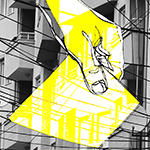In a healthy democracy, for public communication between politicians and citizens to function, the media is vital. In western Europe, media communications theorists have suggested that over the past 30 years we have witnessed a decline in communications quality, warning that a decline in voter turnout and newspaper readership is evidence of a crisis.
However recent scholarship has highlighted a new type of political engagement and communications, with the rise of digital platforms and social media. Voter turnout has increased through social media engagement and whole movements have been founded, including micro-activism and positive movements such as Blacklivesmatter in the U.S. and the recent Pride parade in Kosovo.
Media logic has permeated political life and influenced politicians to such an extent that now media — especially digital and social media — shape political logic and campaigning. In the case of Kosovo, we have to look closely at the challenges this type of digital politics and media engagement pose.
The word ‘democracy,’ as is well known, comes from the Greek Demos, meaning people, and Kratis, meaning power or rule; the oft-repeated, rule of the people by the people for the people, as coined by Abraham Lincoln. Although established in antiquity and not without problems, democracy did not re-emerge in Europe until the Enlightenment.
From the ancient Greeks to the coffee houses of 17th century London, to the so-called “Twitter revolutions,” public debate has been, and is, vital to democracy.
Thinkers like Thomas Hobbes theorized the role of the state in relation to its citizens. Hobbes, in his work “Leviathan,” argued that 17th century humans lived “nasty, brutish and short” lives. They needed a strong state, like the sea monster Leviathan, to protect subjects from one another. However, in this system, corrupt and unsavory sovereigns could abuse the power of the state and harm citizens.
This led thinkers like Jean-Jacques Rousseau and John Locke to later propose that citizens of a state should enter into a “social contract” with their protectors, allowing citizens to revoke consent if they felt abused by the state. Finally John Stuart Mill introduced the concept of pluralism within liberal democracy, stating that a “marketplace of ideas” must be publically accessible to citizens. Therefore, in plural liberal democracies, the media is central to political elections.
From the ancient Greeks to the coffee houses of 17th century London, to the so-called “Twitter revolutions,” public debate has been, and is, vital to democracy. Yet with social media platforms that have strong algorithmic controls over what is visible and what isn’t, is there a marketplace of ideas, or as some have suggested, numerous “filter bubbles” and “echo chambers”?
On the eve of local elections in Kosova and with political campaigning well underway, as voters are about to head to the polls it is important that we consider the role of traditional and digital media, especially since this is very different from the previous media system that was an extension of the state apparatus. As I have previously written, local elections are important as local government governs much of what affects citizens’ daily lives.
How the media in Kosova cover these elections and report on the promises and manifestos is key to the debate and outcome of these elections. This will determine if and how citizens get to live their lives, and enter into what is effectively a social contract with what will become their rulers.
For citizens to make decisions during elections, the media is vital. The quality of this communication matters and media must fulfill their role as watchdogs and enter into an adversarial relationship with potential and elected governments. Their role is to hold politicians to account for their transgressions and abuses, while remaining free from government control. For a true pluralist democracy to be established, media should educate the public and provide advocacy platforms for intelligent debate.
No one should really care what Hashim Thaci’s wife looks like in pictures with Trump and his wife, however, the celebrity culture that we are immersed in demands that this is ‘news.’
However in Kosova this is currently lacking; there is a crisis in public communication — that at times appears to be worse than in other places — and a personalization of politics, which is unhealthy for the media, democracy and citizens’ lives. Political candidates and party members take to social networking sites to directly campaign to voters, thereby bypassing traditional gatekeepers and professional values. Simultaneously, traditional media are forced to compete and play catch-up to Facebook and Twitter posts and updates. These posts are frequently not based on policy, but an articulation of opinions, excuses or just plain propaganda.
Examples of this include frequent posts by government officials from Hashim Thaci to those aspiring mayoral candidates. Posts usually include pictures with officials and foreign dignitaries or celebrities, while lacking detail about any discussions or diplomacy and appearing to be more like celebrity social events. In some cases where issues are mentioned, they normally bypass any detail of legal or legislative requirements, such as the infamous posts by Shpend Ahmeti about killing street dogs.
This modus operandi focuses on personality over policy, contributing to a personalization of politics that is lacking engagement on issues that will impact citizens’ lives. No one should really care what Hashim Thaci’s wife looks like in pictures with Trump and his wife, however, the celebrity culture that we are immersed in demands that this is ‘news,’ giving rise to a new breed of politicians that understand the mediatization of political life, in-tune to the benefits of digital media and social media platforms.
They have now internalized media logic and therefore play to the agenda of the media, becoming more concerned with their media representations and media image than policy-making or implementation of legislation. Meaningful agenda setting is being bypassed for photo-ops or populist discourses.
The use of Facebook and Twitter to influence public opinion, blame rivals and project a desired image and identity, rather than actual policy, is increasingly the route that politicians and political candidates alike are taking. However this can, and sometimes does, backfire. Take, for example, the #KosovoInUnesco bid, which failed because actual political lobbying was missing, while the government focused on a glitzy social media campaign (one which was not properly thought out and that did not consider that algorithms would most likely show the campaign only to those who supported the idea in the first place).
Isa Mustafa, Shpend Ahmeti and Albin Kurti are not dissimilar to such cult leaders, while in the recent general election, Kadri Veseli also tried to get in on the act.
What concerns me for citizens as they head to vote is that this is a practice that is influencing voters. This is not exclusive to Kosovo; throughout Europe and America, populist politicians are offering vague policy statements and playing on identity politics — and winning votes by doing so. Donald Trump and Nigel Farage are good examples in the U.S. and U.K., whereas in Kosovo Isa Mustafa is an example of a prime minister who prefered his Facebook wall to press conference lecterns.
Shpend Ahmeti’s posts such as the one he posted on Friday, October 13 (in Albanian) — “They can all slander together! The truth is bigger, always, like it was in 2013 and it will be on October 22! #WithHeart” — are the epitome of populist discourse. This is a problem but even more so when he conflates personal posts with political posts, making it very murky for the public to understand if he is making official or personal declarations and thus evading accountability.
This phenomenon is contributing to the growth of ‘post-truth’ politics, wherein voters appear more interested in the personal opinions of the political actors rather than factual information and policy positions. Perhaps it will come as no surprise that, when fact-checked, seven out of 10 of Trump’s campaign claims were false. However, by bypassing traditional media for Facebook and Twitter, unscrupulous politicians are getting a direct line to the public, and this is now much easier than ever before.
We are also witnessing an increase in civil society activists and journalists standing for political office rather than working on keeping a check on politicians and government and informing the public. In Kosovo, the main political parties have long drawn in former journalists and civil society activists. Similarly, last week in Albania, three Kosovar civil society activists were appointed to Edi Rama’s cabinet.
Within this confusing change of digitalization, mediatization and personalization of politics, is also the growth of presidentialization within politics. Although, normally this argument applies principally to the United Kingdom, where the example of former prime minister Tony Blair is used to demonstrate this phenomenon, in Kosovo, it is also taking root.
Individuals are being voted for and followed on social media platforms based on their slick campaigns and celebrity personalities. Effectively becoming rulers of their social media spheres and escaping traditional media accountability and checks. Isa Mustafa, Shpend Ahmeti and Albin Kurti are not dissimilar to such cult leaders, while in the recent general election, Kadri Veseli also tried to get in on the act.
Information and ideas entering the public sphere are key in a healthy democracy but not if they are unchecked and ruthlessly promoted on social media.
The problems this causes for citizens are manifold. From the election of incompetent politicians such as Trump, to more dangerous officials that have the power to execute policy that is detrimental to society, while seamlessly coercing agreement and a mandate through social media posts. To still more dangerous spin-doctors, who yield immense power yet are not accountable or responsible to the public for their actions.
In the case of Kosovo, with a weakened media and a conflation of civil society and journalism with politics, we have a yet more dangerous scenario in which politicians and political actors take to social media platforms where they have thousands of followers and can command them to do their bidding. Although they claim not to have responsibility for the actions of their followers, they are responsible through their calls on social media, which influences those followers, especially when they declare that there is a political stalemate on an issue, thereby suggesting that citizens take matters into their own hands.
This is a situation that requires not only regulation of direct campaigning and social media use by politicians and government officials but also scrutiny of social media posts and the lack of fact-checking by mainstream media. Information and ideas entering the public sphere are key in a healthy democracy but not if they are unchecked and ruthlessly promoted on social media and by unprofessional media organizations, while journalists and civil society activists scamper for political positions and abandon their duties to citizens.
This leaves our society exposed and at the mercy of unscrupulous political leaders; so I will not be surprised if people have “nasty, brutish and short” lives after all.
Feature image: Majlinda Hoxha / K2.0.

Back to Monograph on Local Elections 2017


